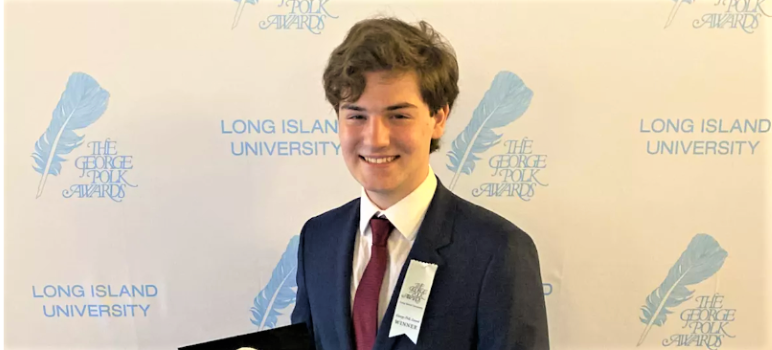Theo Baker, a Stanford University freshman, investigated Stanford's President, resulting in President's resignation. How cool is that"
From San Jose Inside:
Stanford Tried to Silence Student Journalist Whose Stories Led to President’s Resignation
/ 3

Theo Baker, student journalist at Stanford. George Polk Award photo, via Los Angeles Times
Reporting by student journalist Theo Baker, a Stanford University freshman, in the Stanford Daily student newspaper led to the stunning resignation last week by Stanford President Marc Tessier-Lavigne.
Baker, son of New York Times chief White House correspondent Peter Baker, earlier this year received a special George Polk Award from Long Island University “for uncovering allegations that pioneering research co-authored by Tessier-Lavigne, a renowned neuroscientist, was supported in part by manipulated imagery and that Tessier-Lavigne and his associates failed to avail themselves of opportunities to correct the record.”
“Baker’s reporting spurred the university to engage an outside counsel who assembled a panel of experts to investigate the allegations,” said the George Polk awards committee.
Rumors of altered images in some of the research papers published by Tessier-Lavigne had circulated for nearly a decade, but in just his first quarter at Stanford, Baker began taking a closer look with a series of articles in the student newspaper. His first articles on the problems surrounding the university president's research when he had been an executive at Genentech first appeared last November.
The Stanford Daily, unlike many college newspapers around the U.S., has been editorially and financially independent for 50 years. That freedom has fostered a tradition of tough, independent investigative journalism.
Baker’s reporting kicked off a chain of events that led to the announcement by Tessier-Lavigne last week that he would step down from his post at the end of August.
Tessier-Lavigne acted Wednesday after an expert scientific panel convened by the university determined that he failed on multiple occasions to correct errors in his published research on Alzheimer’s disease and related topics, and that he managed labs that at times produced sloppy research.
In an interview last week with the Los Angeles Times, Baker said he found a forensic image analyst who examined images in papers that Tessier-Lavigne had published over the years.
Baker told the LA Times: “We’re really lucky that the Stanford Daily is celebrating its 50th year of independence from the university. That was really important. This reporting I don’t think could have happened without that. Especially after we began receiving legal threats from Tessier-Lavigne, I certainly think the fact that we are independent made it possible for us to keep digging.”
The student journalist said he received from Stephen Neal, former attorney for former Theranos CEO Elizabeth Holmes, “a number of aggressive letters” demanding retractions of Baker’s articles. Neal is chair emeritus of Cooley, a major Palo Alto law firm.
Stanford initially said its board of trustees would investigate the Stanford Daily articles. Then Baker reported that one member of the board’s committee, fund manager Felix Baker, had an $18 million investment in Tessier-Lavigne’s biotechnology company.
“After that, he stepped away and they hired the lawyer who then hired some other scientists” to investigate the Stanford president, Baker told the LA Times.
The investigative panel identified substandard scientific practices in Tessier-Lavigne’s scientific paper, but found no evidence of fabrication.
That didn’t deter the determined student journalist – who by the way continued his full course load of history, philosophy and computer science.
Baker told the LA Times, that “We published a story in February which detailed the accounts of four very high-level executives and senior scientists at Genentech, recounting how there was an internal review in 2011 that ordered more research into the underlying experiments after finding out that they were having trouble replicating them.
“After attempts to reproduce the research failed, the program was canceled and the postdoc [who did the experiments] left the company. These four senior executives concluded that it was because the underlying experiments had been fabricated. A fifth executive later told us the same thing.”
Baker also reported that several key witnesses had refused to speak to the Stanford panel because they were not guaranteed anonymity.
“Not only are these sources talking about a very powerful man, they’re also bound by nondisclosure agreements with Genentech,” the student journalist said in his LA Times interview.
Baker said he spent over 1,000 hours on the stories about his university’s president.
“I’m really trying to make sure that I maximize Stanford because I know just how lucky I am to be there,” he said.



No comments:
Post a Comment